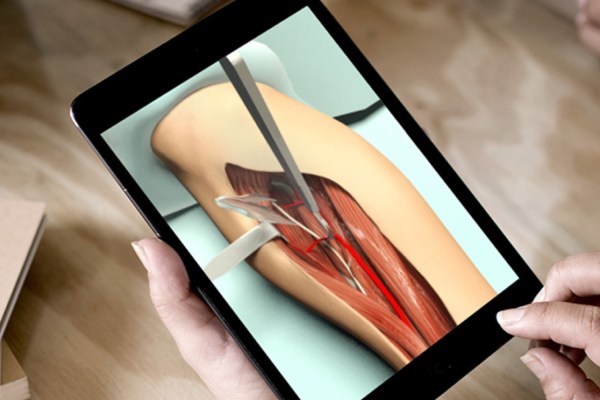London-based app maker Touch Surgery creates a series of apps to help surgeons train ahead of complicated surgery procedures, or to familiarize themselves with new surgical tools, equipment and procedures. The company just announced it has signed a “strategic collaboration” with Johnson & Johnson medical devices subsidiary Ethicon.
“As surgical trainees ourselves, my co-founder Jean Nehme and I experienced many of the problems affecting surgery today,” says Andre Chow, co-founder of Touch Surgery. He points out that surgeons are trained as apprentices, which works well but scales very poorly to meet the global need of surgery. “We wanted to use technology to improve standards of surgical training around the world and to have an impact on patient care.”
The finger is sharper than the sword
Touch Surgery’s solution is aimed at helping medical students and working surgeons practice ahead of medical procedures. The apps are available for Android and iOS. They work by downloading modules — one module per procedure — consisting of 3D-rendered representations of the procedures. The idea behind using computer-rendered content rather than, say, video, is that it can be surprisingly difficult to see what is going on in a video. In addition, it’s easier to highlight key elements of a procedure.
[gallery ids="1417374,1417372,1417373,1417375,1417376,1417377,1417378"]
“We are really excited about the Johnson & Johnson deal,” says Chow. “We have made a huge amount of progress with our apps and over 1.5 million users worldwide. It means we already have the world’s largest digital surgical community. We are operating on a completely different scale to other surgical training solutions. The Johnson & Johnson deal feels like a culmination of our efforts to date.”
The company’s app currently covers more than 75 procedures, but the company has ambitious goals for further growth.
“We have spent the last few years truly understanding surgical procedures — how they are done and how surgeons make decisions in the operating room,” Chow explains. “Our goal is to step back into the operating room and apply our technology to aid the operative environment.”
iPads replacing surgical simulators
The company is bursting into a highly competitive market. By using iPads as the delivery mechanism for the training, the company is taking a novel approach.
“Simulators have benefits and can be proven to have a positive effect on surgical training. However, I think everyone in the field acknowledges that simulation hasn’t yet had the impact on surgery that we had all hoped,” Chow concludes, explaining how Touch Surgery’s solution has the ability to reach a much broader audience. “To use a physical simulator requires access to an appropriate facility with the appropriate staffing in a hospital. Expensive simulators are often kept locked away, with high maintenance costs.”
To aid its goal, the company has raised more than $10 million from a number of big-name investors, including Balderton Capital, Redline Capital and others.
